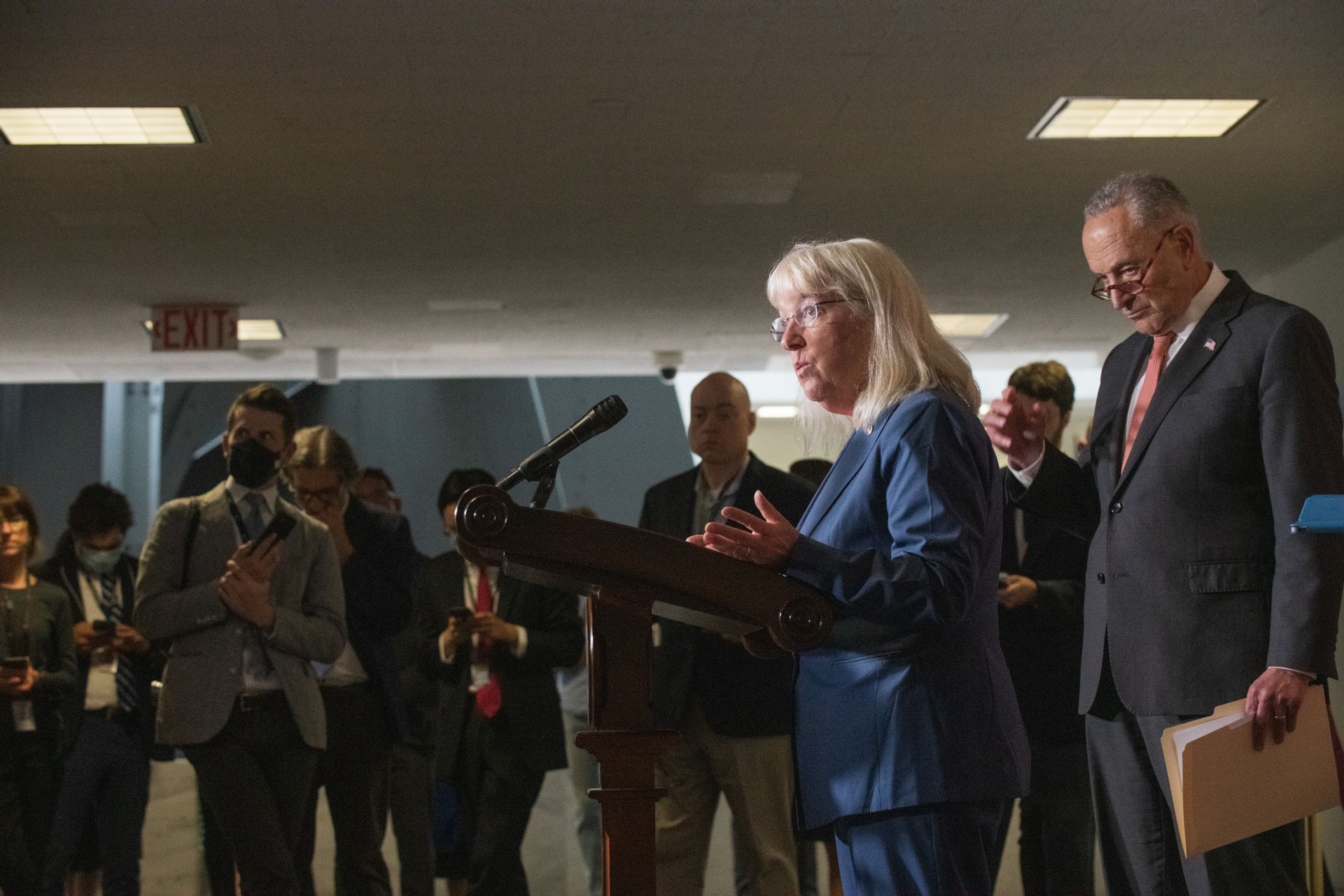Murray: “Here’s what the Inflation Reduction Act will mean for Washington state: lower prescription drug costs, lower health care costs—and bold action on climate change that will deliver lower energy costs, promote energy independence, and create good-paying, clean energy jobs.”
***WATCH: VIDEO of Senator Murray’s remarks can be found HERE***
(Washington, D.C) – Today, U.S. Senator Patty Murray (D-WA), chair of the Health, Education, Labor, and Pensions Committee (HELP), hosted a press call with health care advocates and climate advocates to discuss how passage of the Inflation Reduction Act will help families across Washington state. The Inflation Reduction Act is a historic piece of legislation that will lower prescription drug and health care costs and deliver the largest-ever investment in climate action—lowering energy costs, promoting energy independence, and creating good-paying clean energy jobs. The Inflation Reduction Act is fully paid for by ensuring the very wealthiest and giant corporations simply pay their fair share and would actually reduce the deficit by more than $300 billion.
“Here’s what the Inflation Reduction Act will mean for Washington state: lower prescription drug costs, lower health care costs—and bold action on climate change that will deliver lower energy costs, promote energy independence, and create good-paying, clean energy jobs. Our bill is fully paid for without raising taxes on working families one penny by simply making sure the very wealthiest and giant corporations pay their fair share,” said Senator Murray. “Passing this legislation will be a really big deal—and it marks a historic turning point in how we tackle the climate crisis in this country, while lowering everyday costs for families everywhere in Washington state.”
“For 20 years, Medicare has been legally prohibited from negotiating for lower drug prices and the pharmaceutical industry has been fighting to keep that prohibition in place to protect their profits,” said Cathy MacCaul, Advocacy Director for the Washington state AARP. “Seniors are counting on Congress to finally bring them real price relief. We can’t overstate what a monumental improvement this prescription drug package will be for older Americans and all people struggling to afford their medications.”
“The Inflation Reduction Act will make the largest investment in clean energy and climate action in American history,” said Jamal Raad, Executive Director of Evergreen Action. “Thanks to the efforts of Senate Democrats including Senator Patty Murray, this bill will drive down energy costs for working families and set America on course to reach President Biden’s science based climate targets. These investments will be especially impactful in Washington state where we are experiencing climate impacts like dangerous heat waves first hand, and state leaders and business innovators have been on the forefront of clean energy solutions. We know that this is not a perfect bill—that it is a compromise, but also, that it is essential. The Inflation Reduction Act represents a historic opportunity to turn the corner in America’s fight against climate change. We must seize it.”
The Inflation Reduction Act will finally allow Medicare to negotiate lower prescription drug costs—something Senator Murray has been fighting to do for years—bringing down costs for patients and generating enormous savings for taxpayers. It will cap price increases on prescription drugs at the rate of inflation so that drug makers cannot jack up prices to juice their own profits, and it will cap out-of-pocket prescription drugs costs for Medicare beneficiaries at $2,000 a year—which will help Washington state’s more than 2.5 million seniors save money on their prescriptions.
The Inflation Reduction Act will extend—for three full years—the health care tax credits Senator Murray championed in the American Rescue Plan to keep saving families money on health care. The tax credits have saved millions of Americans thousands of dollars on health care, spurred record enrollment on the exchanges, and helped bring our nation’s uninsured rate to an all-time low. In Washington state, more than 60,000 new people have enrolled in coverage, two in five have found coverage for less than $100 a month, and 40,000 people have found coverage on Washington’s exchange for less than $10 a month.
Washington state is a leader on tackling the climate crisis and the Inflation Reduction Act would only bolster those efforts. The Inflation Reduction Act would establish major cost-saving benefits for Washington state consumers with home energy rebates and consumer tax credits to invest in energy efficiency— rooftop solar, heat pumps, appliances, and more. It would also establish $4,000 tax credits for consumers purchasing used clean vehicles and up to $7,500 for new clean vehicles—encouraging manufacturers to put more clean vehicles on the market.
The climate provisions in the Inflation Reduction Act would implement major clean energy tax credits and grants that would spur an economy-wide transition to clean energy—from our utilities to manufacturing industry. This would help build on and expand existing solar and wind energy production in Central and Eastern Washington to move us towards sustainable energy independence and takes steps to help rural communities and farmers across Washington state adapt to a rapidly changing climate.
The Inflation Reduction Act will help electrify ports like the Port of Seattle to help cut those emissions and make the air around them safer to breathe. The Inflation Reduction Act also funds research and development into cleaner aviation fuel and technology – much of which happens in Washington state.
You can find a summary on the climate and energy provisions of the Inflation Reduction Act here.
You can find a summary on the tax provisions of the Inflation Reduction Act here.
You can find a summary on the prescription drug provisions of the Inflation Reduction Act here.
###


